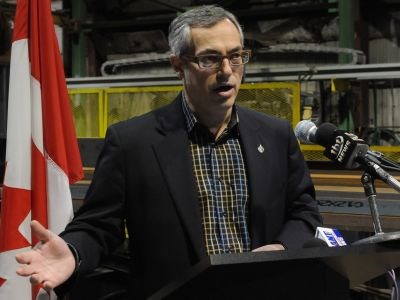A deadline hasn’t been established to implement changes to the federal government’s vetting process for resource development projects, but legislation ideally should come “as soon as possible,” said Tony Clement during a recent tour of the North.
“We do think it’s urgent economically to continue to develop our natural resources and move ahead with this, what we call ‘one project, one review,’ which is a lot more sensible,” Clement said. “It puts all the issues—federal issues, provincial issues, First Nations issues—on the table at the same time so that we can have one thorough review of these projects rather than having this piecemeal approach.”
The practice will make it easier for “virtuous” projects to be assessed quickly so they can move through to development, he added.
Clement, FedNor minister and head of Canada’s Treasury Board, spoke about the pending legislation following a tour of Thunder Bay manufacturer Coastal Steel on June 4.
Resource development is significant: the federal government predicts that, in the next 10 years, more than 500 major economic projects representing $500 billion in new investments are planned across Canada.
Focused on large projects, including pipelines and mining, the legislation is designed to streamline the approval process.
It concentrates on four areas: making project reviews more predictable and timely; reducing duplication of project reviews; strengthening environmental protection; and enhancing consultation with Aboriginal peoples.
Timelines would include 24 months for panel reviews, 18 months for NEB hearings, and 12 months for standard economic assessments (EAs).
Instead of overlap across provincial and federal governments, provincial EAs could be substituted, or considered equivalent to, federal EAs, and the decision-making for some permits could be transferred between federal departments and to other jurisdictions.
Clement emphasized that a full public review period would still be part of the process.
Responding to critics who say the new legislation will allow the government to fast-track projects without properly assessing their environmental impact, Clement said the purpose of the legislation is not to weaken the environmental assessment process, but to replace the “hodge podge” that occurs now.
“I think that a lot of environmental groups just oppose the projects,” he said. “It’s their right to do that, but they’re using a process to oppose these projects using process rather than substance, so they throw
up all these roadblocks.”
Clement noted that Enbridge is receiving flak following its purchase of a pipeline that would allow Alberta oil to be flowed to Ontario.
No new pipeline is being built—the flow of oil is simply being reversed— but there have been 10,000 objections to the project. “There’s going to have to be a process by whichthey go through all 10,000
of those objections; to me, that’s absurd,” Clement said. “Here’s a virtuous thing—no environmental impact that anybody knows of—that is going to be held up for years because the process is being used by groups to oppose any kind of change for any kind of reason, so this is the kind of thing that’s got to stop.”
There has also been mixed reaction from First Nation communities, Clement said. Some are eager to open a dialogue with the government, while others “fear change and are concerned about it.”
The new legislation would require it to be integrated into project reviews, there would be a lead federal co-ordinator designated for reviews, and there would be a co-ordinated federal and provincial consultation.
The government is providing $13.6 million over two years to support these changes.




